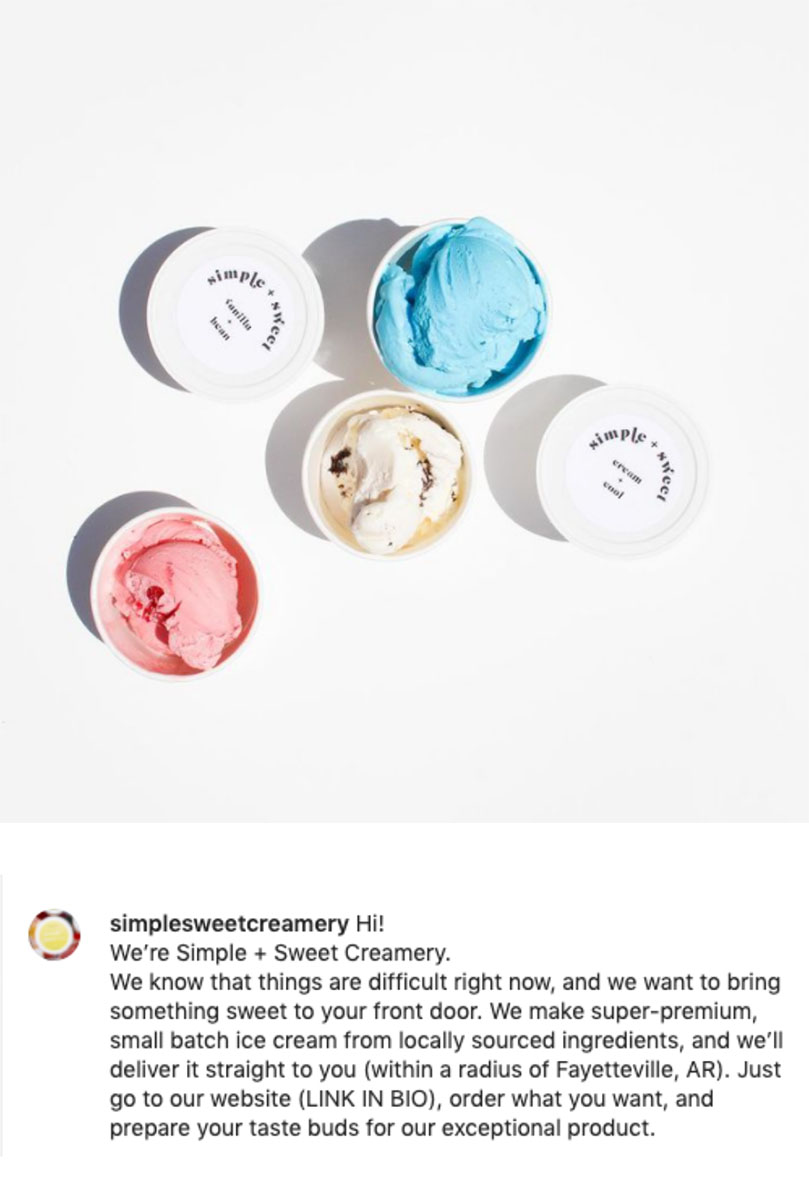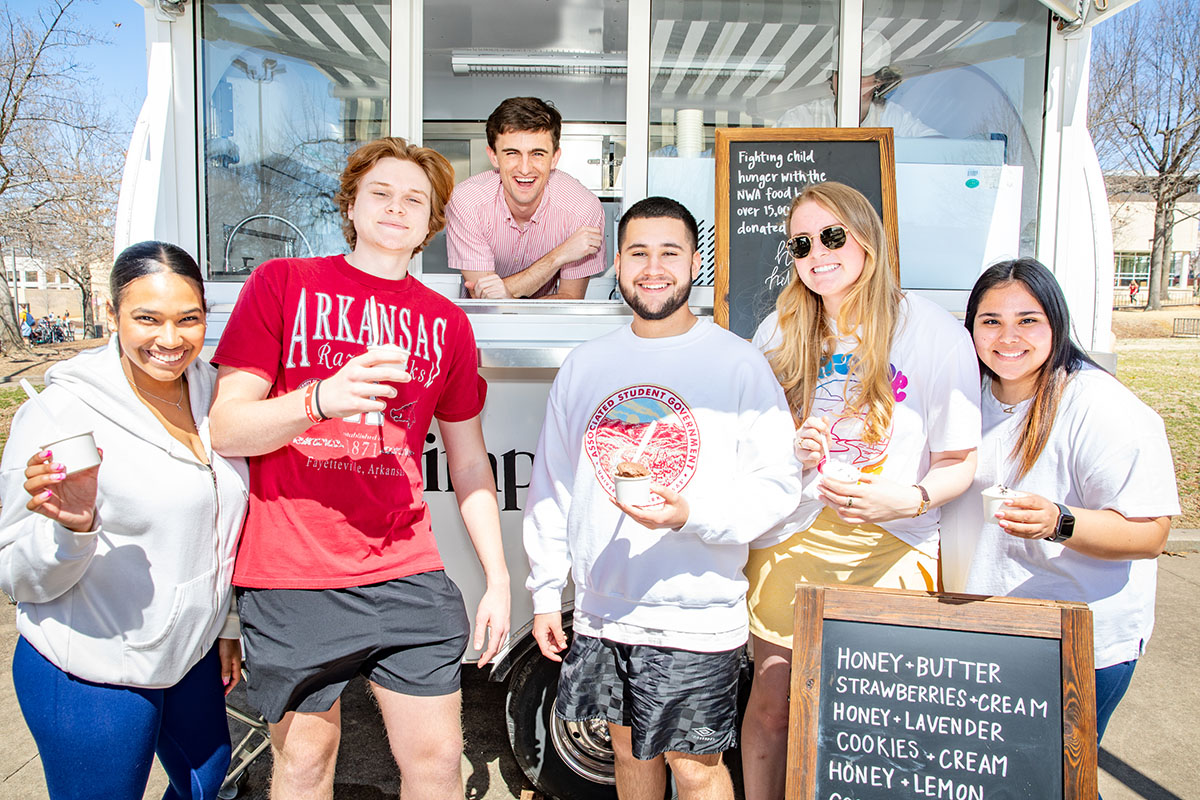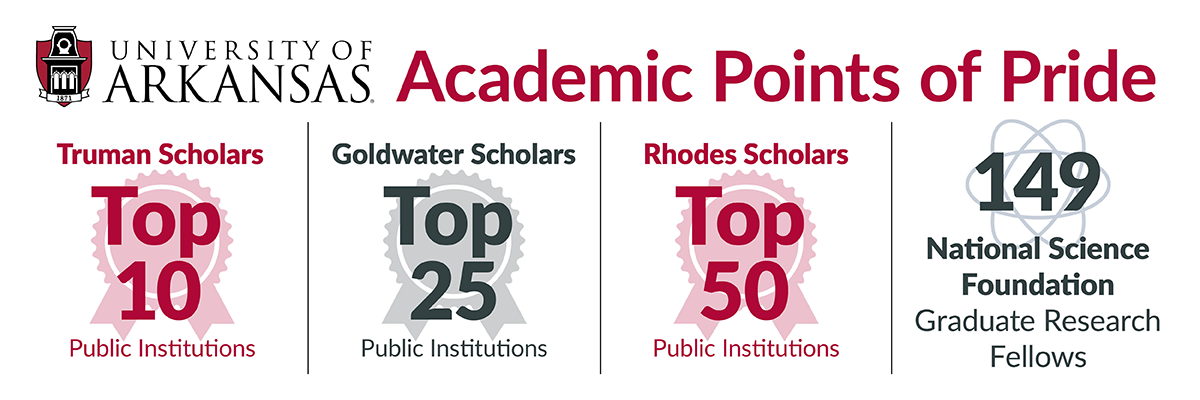
A Hunger to
Make a Difference
Coleman Warren is devoted to helping others and serving Arkansas…literally. The Farmington, Arkansas native started his own ice cream business during his sophomore year at the University of Arkansas and directed his profits to the fight against food insecurity. Recently, his dedication to Arkansas and stellar achievements in and out of the classroom culminated in his being named a 2022 Rhodes Scholar for graduate study. As one of only 32 in the country, Warren will begin his graduate degree at Oxford University in fall 2022, with the goal of returning to Arkansas and continuing to support his home state in the future.
 The Rhodes Scholarship is the oldest international fellowship and is intended to
bring outstanding students from many countries around the world to the University
of Oxford. The first American Scholars were elected in 1904, and Neil Carothers of
the University of Arkansas was a Rhodes Scholar that first year. Eleven U of A students
have been selected as Rhodes Scholars. In 2021, more than 2,300 outstanding students
applied for the 2022 Rhodes Scholarship.
The Rhodes Scholarship is the oldest international fellowship and is intended to
bring outstanding students from many countries around the world to the University
of Oxford. The first American Scholars were elected in 1904, and Neil Carothers of
the University of Arkansas was a Rhodes Scholar that first year. Eleven U of A students
have been selected as Rhodes Scholars. In 2021, more than 2,300 outstanding students
applied for the 2022 Rhodes Scholarship.
As a student at the U of A, Warren pursued two majors (industrial engineering and political science), volunteered his time with campus and community organizations and was elected president of the Associated Student Government. He won a volunteer service award, was named to the Chancellor’s List, and was designated as a Clinton Global Initiative University Fellow. He was also named a 2021 Harry S. Truman Scholar.
And he did it all while maintaining a 4.0 grade point average in both of his majors and launching his own business and non-profit.
Sweet Beginnings
The cherry on top of Warren’s academic success is his achievement as an entrepreneur, which comes with a side of philanthropy. He encountered a life-changing experience following his freshman year of college while serving as an AmeriCorps VISTA Summer Associate for the Food Bank for the Heartland in Omaha, Nebraska. There, he witnessed hunger disparities for the first time in his life. It was eye opening and ignited a passion for fighting food insecurity that fueled the rest of his college experience and future.
 Warren’s senior thesis was titled, “A Quantitative Analysis of Food Pantry Spatial
Availability in Washington County, Arkansas,” and investigated potential policy solutions
to addressing food insecurity.
Warren’s senior thesis was titled, “A Quantitative Analysis of Food Pantry Spatial
Availability in Washington County, Arkansas,” and investigated potential policy solutions
to addressing food insecurity.
At Oxford, Warren plans to pursue a Master of Philosophy in Comparative Social Policy and analyze what is done to combat hunger in multiple countries and craft a thesis about rural food insecurity’s impacts on child development.
“What I saw in Nebraska changed my perspective on hunger fundamentally,” he said. “And I knew that my home state of Arkansas was even more food insecure.”

Warren was specifically moved by how food insecurity impacted children, and he worked closely with the Kids Cruisin’ Kitchen program, which fed more than 600 kids each day as part of The Salvation Army of Omaha.
“There is a lot of emphasis on education in our society, but how can you focus on schoolwork when you don’t know where your next meal is coming from?” he asked.
With a hunger to make a difference, Warren set out to create an economically sustainable business model for a new company with the purpose of fighting food insecurity. Inspired by the local cuisine in Nebraska – particularly the “farm to cone” mentality of Omaha-based Coneflower Creamery – an idea began to form. Residents of Northwest Arkansas would surely appreciate small batch artisanal ice cream with a focus on local ingredients and a philanthropically minded mission.
Warren began developing a business plan and visited another Arkansas-based small batch ice cream business, The Spring Dipper, in Mammoth Spring. What started as a tour and a taste test quickly evolved into Warren’s first product sample and $20,000 in seed funding from an anonymous investor. Simple + Sweet Creamery was born, but it soon faced its first hurdle – the emergence of the COVID-19 pandemic.
Armed with 30 gallons of ice cream and the desire to continue his business’s launch, Warren took to Instagram, leading with the caption, “We know that things are difficult right now, and we want to bring something sweet to your front door.” The product sold out within 24 hours, and a fan base was born. One follower commented, “This is the ice cream that will keep me alive during quarantine.”
This initial success led to an investment in a commercial ice cream machine and blast freezer, as well as procurement of production space in an unused cafeteria in Warren’s hometown. Throughout the process, Warren applied concepts he learned in the classroom to his burgeoning business, like navigating rezoning guidelines and seeking approval from the Arkansas Department of Health.
In October 2020, less than six months after his initial taste tests in Mammoth Spring, Warren formally launched his endeavor and expanded his flavor line-up. The ice cream business has been churning away ever since, and – true to his word – Warren has donated more than 15,000 meals so far, in addition to raising awareness about hungry kids in Northwest Arkansas. His long-term goal is to give away more than 50% of Simple + Sweet’s profits to the Northwest Arkansas Food Bank.
Simple + Sweet has now sold more than 2,500 pints of ice cream since its inception and has a seasonal trailer for selling product on the U of A campus and throughout the community. All ingredients are locally sourced, and Warren is in negotiations to offer his product in community stores. While he’s away at the University of Oxford, the business will be run by an operations manager, so Warren can focus on engaging with his new community and studies.
 In 2021, Warren and his team won First Place in the Arkansas Governor’s Cup Winrock
Automotive Small Business Division, which included an additional $15,000 he could
use for his company.
In 2021, Warren and his team won First Place in the Arkansas Governor’s Cup Winrock
Automotive Small Business Division, which included an additional $15,000 he could
use for his company.

Dedicated to Arkansas
Warren’s family goes back seven generations in Arkansas, and his father grew up in the rural community of Tilly, Arkansas. His mother is also a U of A alumna, having earned her Bachelor of Science in Industrial Engineering in the 90s.
“I don’t know where to begin on what the U of A has given me,” he says. “The experiences I had in and out of the classroom played a huge role in how I think and influenced my pitch to Rhodes.”
"I don’t know where to begin on what the U of A has given me,” he says. “The experiences I had in and out of the classroom played a huge role in how I think and influenced my pitch to Rhodes."
Warren recalls his “full-circle moment” when his mother pointed out the industrial engineering building to him on campus for the first time. His interest in both engineering and political science, as well as the campus involvement opportunities and robust opportunities through the Honors College, also drew him to choose the state’s flagship.


He notes that his degree in industrial engineering has helped him with the accounting skills needed for his business, in addition to developing standardized processes and performing economic analyses. His political science courses have provided historical context of the south and the social policies that could impact food insecurity in the future.
“My involvement on campus has helped me hone leadership skills, connected me with stakeholders and taught me how to negotiate and advocate for others,” he says. “It has also provided me with contacts for my team, which now includes 10 paid employees.”
As president of the Associated Student Government, Warren says he has learned how to delegate as well – something that will be critical while he’s “across the pond” working on his graduate degree.
“If you’re not delegating, you’re taking an opportunity away from somebody,” he says.
He has already developed another non-profit, Simply Feeding, which teaches kids in rural Arkansas communities about entrepreneurship, branding, marketing, selling products and how to run a small business.
“A program like this can change a kid’s perception of themselves,” Warren says, noting that he would absolutely encourage them to attend the University of Arkansas like he did. “Kids coming to school here makes Arkansas a better state.”
Short Takes: A Hunger to Make a Difference
Hear more about Coleman’s dedication to Arkansas in this Short Takes episode.
